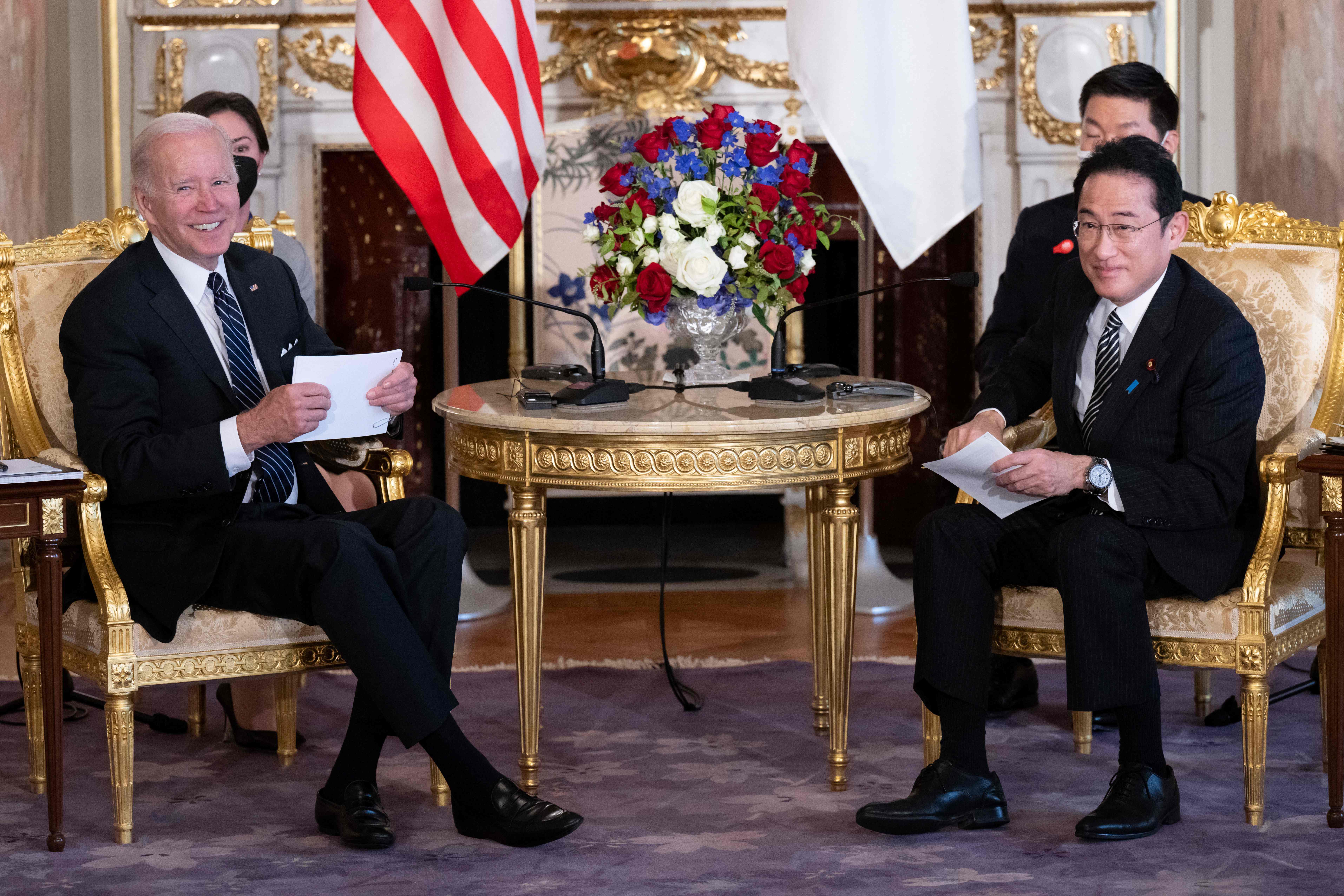Biden can draw on lessons from Ukraine amid tensions with China over Taiwan
Removing diplomatic ambiguities would avoid any misunderstanding with Beijing, as Borzou Daragahi explains


For more than four decades, the United States trod a careful line on Taiwan, leaving it unclear how far it would go to support the breakaway island in the event that China sought to take control of it militarily. But in recent years, that finely calibrated caution has begun to erode. Russia’s war in Ukraine may have demolished it.
President Joe Biden appeared to set aside decades of carefully calibrated US policy on Monday by explicitly vowing to defend the island nation of 24 million should Beijing launch military action to reclaim for the mainland what it regards as a breakaway territory.
Mr Biden was answering a reporter’s question at a joint news conference in Tokyo with the Japanese prime minister, Fumio Kishida, during what was his first trip to Asia as president. He was asked whether the US would go as far to defend Taiwan as it has Ukraine.
“Yes,” the president replied. “That’s the commitment we made.”
Mr Biden continued that, while the US agrees with the policy that Taiwan should eventually be reunited with mainland China, “the idea that it can be taken by force, just taken by force, is just not appropriate”.
It could just be that the gaffe-prone Mr Biden misspoke, as he did when he urged the overthrow of Vladimir Putin during a visit to Poland in March. But the president made similar remarks about Taiwan in October, though not on China’s doorstep. And though his handlers were taken aback by his remarks about Taiwan, they have yet to walk them back unequivocally, as they quickly did after the comments about the Russian ruler.
“Our policy has not changed,” one official told CNN.
More likely than not, the ongoing Russian war against Ukraine has spurred Americans, from the president on down, to reconsider some of their long-standing rules of diplomatic protocol. After Ukraine, the US wants to make it clear to other world powers that speaking softly should not be confused with being shy about using the big stick.
The whole point of carefully crafting positions of ambiguity over frozen conflicts such as Ukraine or Taiwan is to create some breathing space so that countries can work out their differences, perhaps build up commercial and cultural ties, and come up with peaceful resolutions that satisfy all sides.
But if countries are going to start engaging in 19th-century-style imperial land-grabs, such delicate detente does little good. It could actually do some harm.
Moscow’s perception of western hesitancy on Ukraine is likely to have contributed to Mr Putin’s disastrous decision to invade on 24 February. In addition to thousands of pieces of weaponry sent by the west, the US just signed off on a $40bn (£32bn) package of aid – a total equivalent to the entire GDP of Tunisia – to support Ukraine in its efforts to fend off the Russian invasion.
Had the west bellowed in advance about how far it would be willing to go to defend Ukraine, instead of making mealy-mouthed attempts at soothing Russia, perhaps Mr Putin’s calculations would have differed.
Taiwan has a history that is somewhat analogous to that of Ukraine, an on-and-off territory of imperial Russia and the Soviet Union that has long sought to chart its own course.
Historically linked to, but also somewhat separate from, mainland China over the centuries, Taiwan emerged in the late 1940s as a brutal right-wing dictatorship run by anti-Communist Chinese nationalists fleeing Chairman Mao Zedong’s victorious Red Army.
But also like Ukraine, Taiwan emerged from decades of authoritarianism to become a lively democracy where human rights and individual liberties are respected. In 2016, the same year Donald Trump defeated Hillary Clinton, Taiwan elected its first ever female president, former law professor Tsai Ing-wen. Stunningly, Taiwan moved into the ranks of the 10 most democratic nations of the world last year, according to the Economist Intelligence Unit.
Just as defending Ukraine underscores western commitments to core principles of sovereignty and liberty, defending Taiwan is not just about challenging another world power on some global chessboard, but protecting a thriving democracy.
For now, Washington’s explicit language on Taiwan has angered Beijing.
“On issues concerning China’s sovereignty and territorial integrity and other core interests, there is no room for compromise,” Wang Wenbin, a spokesperson for the Chinese foreign ministry, said in response to Mr Biden’s remarks. “Be cautious in words and deeds on the Taiwan issue, and [do] not send any wrong signal.”
In the long run, Mr Biden’s straight talk can help clear up any confusion within China’s National People’s Congress, and among the country’s leadership. The lesson of Ukraine is that any diplomatic ambiguities about whether, and how, Washington and the west would respond to an invasion of a valued partner are more likely to hurt than to help.






Join our commenting forum
Join thought-provoking conversations, follow other Independent readers and see their replies
Comments